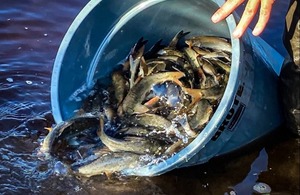EA partnerships drive £22.5m licence income further to enhance fisheries and promote angling
The Environment Agency worked with over 500 partners and thousands of volunteers to enhance fisheries and promote angling.

Credit: Environment Agency
- The Environment Agency worked with over 500 partners and thousands of volunteers to enhance fisheries and promote angling
- These partnerships combine vital resources to safeguard fisheries through coordinated enforcement efforts and supporting their local environment
- 43,224 new people were introduced to angling, boosting licence sales to reinvest in fishing services across England
The Environment Agency has published its Fisheries Annual Report for 2023 to 2024 today (22 November).
The report details how the Agency has invested income from the sale of fishing licences to maintain, develop and improve freshwater fisheries.
Between April 2023 to March 2024, 910,973 fishing licenses were sold, generating an income of £22.53 million. This income was directly reinvested to support angling and fisheries across England by boosting fish stocks, enhancing fishery habitats, providing more safe places to fish, combatting illegal fishing and ensuring a sustainable future for fisheries.
The report finds a driving force supporting the goals of the fisheries service was partnership working.
In 2023 to 2024 the Environment Agency teamed up with over 500 partners including The Angling Trust, Wild Trout Trust, Institute of Fisheries Management, the Riverfly Partnership, local river trusts, angling clubs, charities, and many more.
These partnerships allow EA to combine vital resources with other organisations, driving fishing licence income further and delivering an even greater impact. They have helped to:
- Introduce 43,224 new people to angling
- Carry out 4,698 riverfly surveys
- Enhance 285km of rivers across England
- Respond to 986 requests for advice on managing predation
- Distribute over £1.5M of fishing licence income through the Fisheries Improvement Programme, Angling Improvement Fund and the Get Fishing Fund
Jenni Balmer, Deputy Director of Nature Recovery at the Environment Agency said:
We thank all those that have bought a fishing licence in 2023/24. Without you, the fishing licence customer, we would be unable to achieve the investment needed to fund the fisheries service.
We have used this income to achieve more by working in partnership with multiple organisations. Working together is key to us being able to deliver benefits for fishing and fisheries across England.
The Angling Trust, the national governing body of the sport, used fishing licence income through the National Angling Strategic Services (NASS) contract to provide greater accessibility at fisheries, participation events and campaigns. It introduced more people to angling, coordinated fisheries enforcement efforts and intelligence-sharing and provided advice and guidance on predation, non-native species and biosecurity issues.
Jamie Cook, CEO of the Angling Trust said:
The Angling Trust works in partnership with the Environment Agency to deliver a range of services to engage, advise and educate anglers – re-investing fishing licence income back into grass roots activities. This includes introducing more than 43,000 children and families to fishing for the first time, supporting clubs and fisheries through our Fisheries Support Service, advising on biosecurity and predation matters, administering the Angling Improvement Fund to provide funding for clubs and fisheries, and supporting the professionalisation of clubs to make them more accessible to new anglers.
This partnership ensures anglers’ fishing licence money is directed to protect and improve the waters we fish, promote the health and wellbeing benefits of angling to a new generation of anglers, and develop clubs and fisheries to safeguard their future for years to come.
Protecting habitats is vital to providing healthy fisheries. Through fishing licence income, the Riverfly Partnership trains volunteers to help monitor the water quality in rivers. For 2023 to 2024 the EA gave the organisation £59,000 of fishing licence income which in turn created £512,000 of match funding.
Simon Johnson, Executive Director of the Freshwater Biological Association (FBA) which hosts the Riverfly Partnership said:
The Riverfly Partnership receives annual funding support from the EA via fishing licence income. The on-going investment has enabled FBA to maintain and develop the Riverfly Monitoring Initiative for many years.
This citizen science project (one of the largest of its type in Europe) has trained and supported thousands of anglers on hundreds of catchments throughout England to understand and care for their precious fisheries and working closely with EA ecologists, fisheries teams and other stakeholders, such as Rivers Trusts, we are striving to ensure that the data obtained by ‘angler-scientists’ is used to protect and improve freshwaters, be it through a greater sense of stewardship, conservation management and identification of pollution incidents in locations not covered by routine monitoring programmes.
Fishing licence income was also used to provide advice and guidance for angling clubs. In 2023 to 2024, the Institute of Fisheries Management (IFM) used licence funds to run a series of weekend stillwater fishery management workshops, sharing knowledge with clubs on sustainable management of stillwater fisheries.
Paul Coulson, Acting Chief Executive of the IFM said:
The IFM has continued its collaboration with the Environment Agency to deliver regional fishery management workshops specifically for angling clubs and associations.
These workshops, funded by rod licence income, focus on the sustainable management of stillwater fisheries. They equip club volunteers with the knowledge and practical skills necessary to enhance water quality, maintain fish health, and improve the overall ecology of their waters. This investment not only supports healthy ecosystems but also improves the angling experience. This initiative has used rod licence income to promote sustainable fishery management across England.